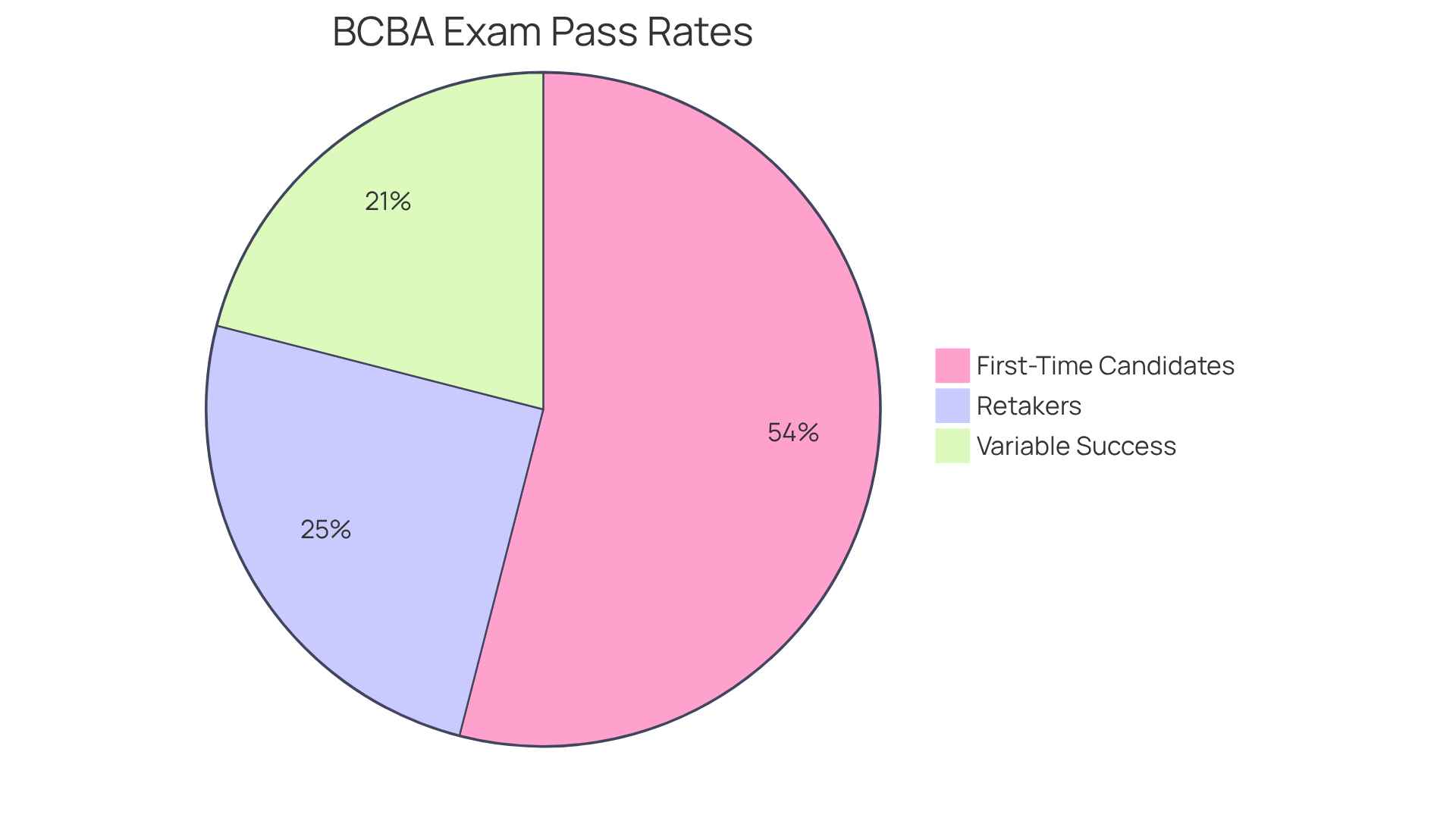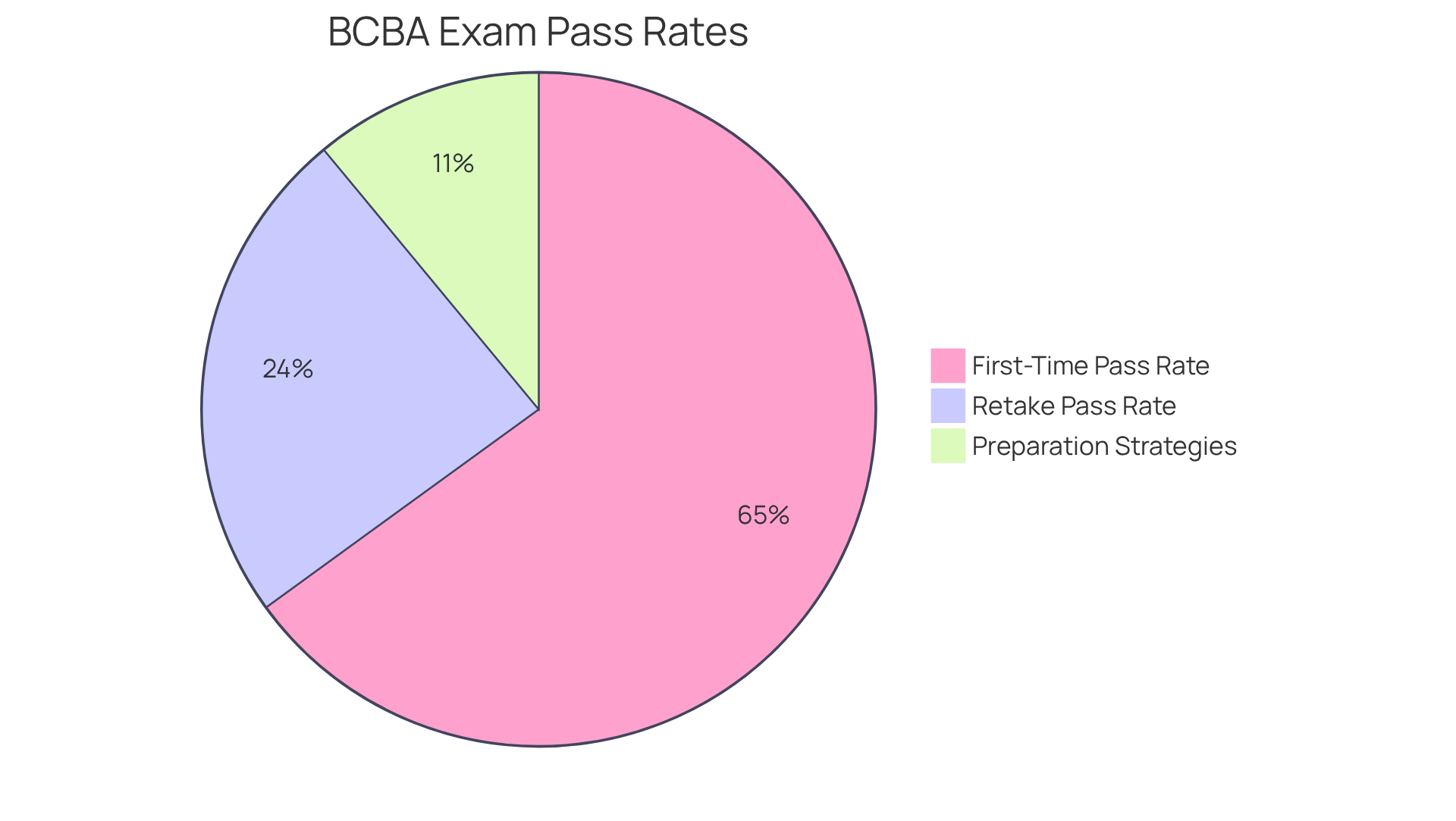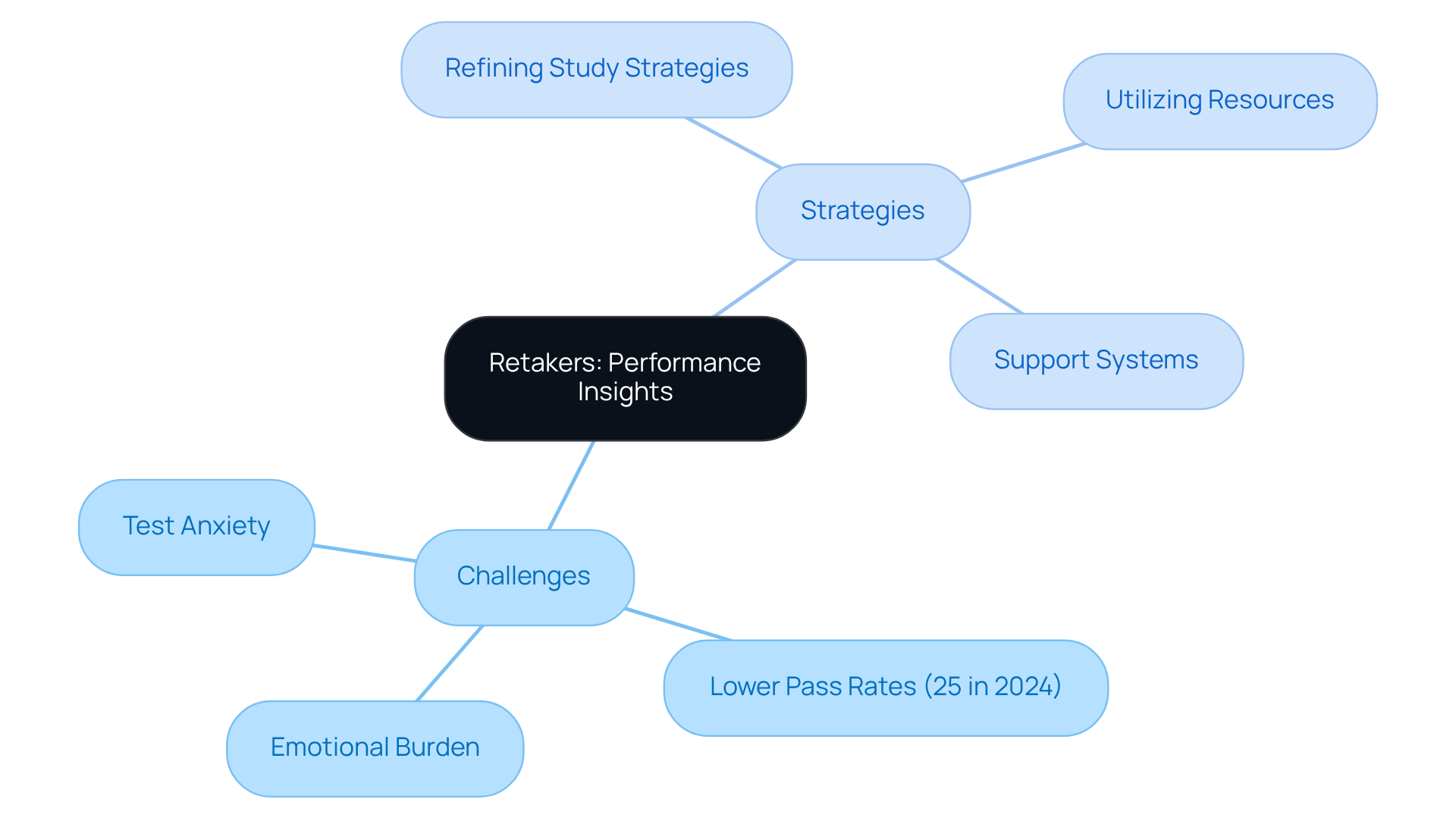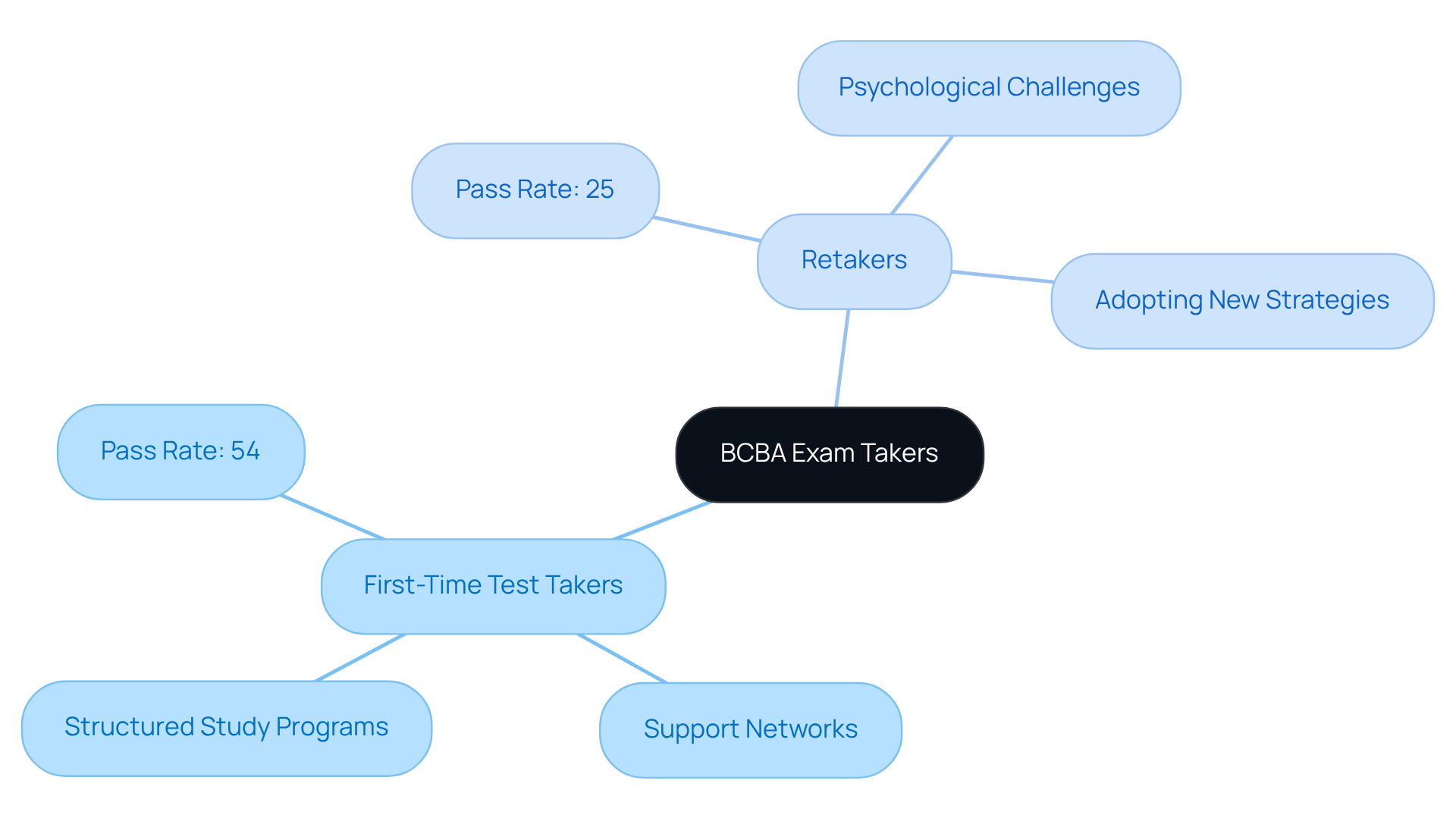October 19, 2025

The BCBA exam pass rates highlight a striking contrast between first-time takers and retakers. In 2024, first-time candidates achieved a pass rate of approximately 54%, while retakers managed only about 25%. This significant disparity raises questions: What factors contribute to such a difference?
The landscape of Behavior Analysis is rapidly evolving, with a projected 25% increase in demand for Board Certified Behavior Analysts (BCBAs) over the next five years. As candidates prepare for the BCBA exam, understanding the stark differences in pass rates between first-time takers and retakers becomes crucial.
The Behavior Analyst Certification Board (BACB) oversees the BCBA assessment, evaluating the essential knowledge and skills necessary for effective practice in Applied Behavior Analysis. Notably, the demand for BCBAs is projected to increase by 25% over the next five years. This statistic underscores the importance of understanding the dynamics of the field. The BCBA exam pass rate has varied over the years, influenced by several factors such as modifications in exam structure, the growing complexity of the content, and candidate readiness. In 2024, the BCBA exam pass rate for first-time exam participants was approximately 54%, reflecting a decrease from earlier years. In contrast, those retaking the test experienced a slight enhancement in the BCBA exam pass rate, achieving a success figure of 25%, which is an increase from 24% in 2022 and 23% in 2023. This trend highlights the challenges faced by those attempting the exam again, as the BCBA exam pass rate for these individuals historically experiences lower success rates, often ranging from 15% to 40%.
Expert insights emphasize the importance of tailored study strategies and robust preparation. Dana Meller, founder of PTB, notes that first-time test takers generally have better odds of achieving a high BCBA exam pass rate; however, with effective planning and a focus on foundational ABA principles, retakers can also succeed. The recent modifications to the assessment structure, particularly with the 6th Edition updates, have streamlined the test. Yet, individuals are still encouraged to utilize diverse study materials, including practice tests and question banks, to enhance their chances of success.
Case studies reveal that individuals from accredited programs typically achieve superior results, which is reflected in a BCBA exam pass rate of 62% in 2020 compared to only 25% for those from non-accredited programs. This emphasizes the essential role of program selection in influencing assessment results. Furthermore, individuals with substantial supervised fieldwork hours demonstrate greater success levels, highlighting the importance of practical experience in preparation for achieving a high BCBA exam pass rate.
It is essential for candidates to stay informed about new opportunities, including leadership roles and flexible working conditions in the ABA field. Understanding these dynamics is crucial for aspiring BCBAs as they navigate their certification journey and for employers aiming to assess the competency of potential hires in the ABA therapy field. To explore these opportunities further, consider submitting your resume.

First-time test takers of the BCBA assessment achieve a notably higher BCBA exam pass rate than those retaking it, with first-time pass rates averaging around 65%. The Behavior Analyst Certification Board observes that 'first-time test-takers typically attain higher scores,' underscoring the advantages of approaching the assessment with fresh knowledge. This trend can be attributed to several key factors:
Individuals who follow these strategies often find themselves better equipped for the assessment. The desire to succeed on the first attempt motivates many to invest significant effort into their preparation, resulting in enhanced outcomes.
Recent trends reveal that those who utilize practice exams and engage in peer study groups tend to perform better, highlighting the importance of collaborative learning within the ABA community. Programs that emphasize mentorship and provide tailored feedback have shown to improve participants' preparedness, helping them avoid common pitfalls and refine their test-taking techniques. Furthermore, data indicates that candidates from Verified Course Sequences (VCSs) with elevated first-time pass rates benefit from rigorous curricula and dedicated faculty. Notably, VCSs within ABAI-accredited programs achieve a BCBA exam pass rate of 74% for first-time test takers, ultimately contributing to their success on the assessment.

Retakers of the BCBA assessment face distinct challenges that can significantly impact their performance. A prevalent issue is test anxiety, which often leads to decreased confidence and hinders exam performance. Statistics reveal that retake candidates historically have a lower BCBA exam pass rate, with only about 25% succeeding in 2024, compared to a pass rate of 46% in 2020. This trend highlights the increasing difficulties encountered by those who retake exams, particularly in relation to the BCBA exam pass rate. Many individuals who attempt the exam again express feeling overwhelmed by the extensive material, frequently resulting in a sense of defeat after their initial failure. This emotional burden diminishes motivation and self-assurance, making subsequent attempts even more daunting.
However, some retakers leverage their prior experiences to refine their study strategies. By focusing on identified weaknesses from previous attempts, they can formulate more targeted and effective preparation plans. Engaging in organized study sessions and utilizing various resources, such as practice tests and flashcards, can help mitigate the effects of test anxiety. Furthermore, support systems, including study groups and professional coaching, play a crucial role in enhancing their chances of success. As highlighted by Blue Jay ABA, mentorship and encouragement are essential components that can significantly bolster a candidate's preparation. Collaborative environments foster accountability and provide diverse perspectives, which are vital for individuals aiming to improve their understanding and skills before their next exam attempt.

A comparative analysis of first-time test takers and those who retake the exam reveals notable differences in preparation, performance, and outcomes. Newcomers typically appreciate a fresh viewpoint and frequently benefit from strong support networks, leading to improved success levels. In 2024, first-time candidates achieved a BCBA exam pass rate of 54%, recovering from a low of 23% in 2023, while those who attempted again faced a significantly lower success rate of 25%. This disparity underscores the advantages of structured study programs and peer collaboration that first-time takers are more likely to utilize.
Conversely, individuals who retake exams often grapple with the psychological ramifications of previous failures, adversely affecting their study habits and self-confidence. Many individuals repeating the exam must adopt new strategies to address their past challenges, such as engaging in structured study plans and seeking mentorship to enhance their preparation. Research indicates that individuals who log additional supervised hours—specifically, the 1,500 hours mandated by the BACB—and practice in realistic conditions tend to perform better, highlighting the significance of practical experience.
This analysis emphasizes the need for tailored support for both groups. While achieving success on the first attempt is crucial, individuals who try again also contribute significantly to the ABA workforce, demonstrating resilience and a commitment to professional growth. Understanding these dynamics can assist stakeholders in creating effective strategies to support all individuals in their journey toward BCBA certification. As the BACB states, 'High BCBA exam pass rates are often a sign of excellent preparation quality,' reinforcing the importance of structured study plans and quality materials for both first-time candidates and retakers.

The dynamics of BCBA exam pass rates reveal a significant distinction between first-time test takers and those attempting the exam again. First-time candidates generally experience higher success rates, attributed to better preparation strategies and support systems. In contrast, retakers face unique challenges, including test anxiety and the emotional weight of previous failures, which can hinder their performance despite their experience.
Key insights indicate that first-time candidates benefit from structured study programs and collaborative learning, resulting in a pass rate of approximately 54% in 2024. On the other hand, retakers saw a modest increase to 25%, highlighting the need for tailored approaches to enhance their preparation. The importance of quality study materials, mentorship, and practical experience cannot be overstated, as these factors significantly influence overall success.
Ultimately, understanding the differences in preparation and outcomes for first-time test takers and retakers is crucial for aspiring BCBAs. As the demand for behavior analysts continues to rise, fostering supportive environments and effective study strategies will be essential in ensuring that both newcomers and retakers can thrive in their certification journey. Embracing resilience and focusing on continuous improvement can transform challenges into opportunities for success in the ABA field.
What organization oversees the BCBA exam?
The Behavior Analyst Certification Board (BACB) oversees the BCBA assessment.
What is the projected demand increase for BCBAs in the next five years?
The demand for BCBAs is projected to increase by 25% over the next five years.
What was the BCBA exam pass rate for first-time exam participants in 2024?
The BCBA exam pass rate for first-time exam participants in 2024 was approximately 54%.
How did the BCBA exam pass rate for retakers change from 2022 to 2024?
The BCBA exam pass rate for retakers increased from 24% in 2022 to 25% in 2024.
What challenges do retakers face regarding the BCBA exam pass rate?
Retakers historically experience lower success rates, often ranging from 15% to 40%.
What study strategies are recommended for BCBA exam preparation?
Tailored study strategies and robust preparation are emphasized, including the use of diverse study materials such as practice tests and question banks.
How do results differ between candidates from accredited and non-accredited programs?
Individuals from accredited programs typically achieve better results, with a BCBA exam pass rate of 62% in 2020 compared to only 25% for those from non-accredited programs.
What role does practical experience play in BCBA exam success?
Individuals with substantial supervised fieldwork hours demonstrate greater success levels, highlighting the importance of practical experience in preparation.
Why is it important for candidates to stay informed about opportunities in the ABA field?
Staying informed about new opportunities, including leadership roles and flexible working conditions, is crucial for aspiring BCBAs as they navigate their certification journey.
Our expert recruitment strategies and AI-driven sourcing ensure that you receive top-notch candidates quickly, without compromising on quality. Whether you’re looking for BCBAs, Clinical Directors, or RBTs, we’ve got you covered.